Share

When Diplomacy Fails Podcast
WDF 30: The Long War V
•
Check the screen and a map of the Hungarian plain should be there - if not do let me know!
In this episode we continue our narrative of the period immediately following the fall of Hungary and the escalation of the Ottoman-Habsburg rivalry. We investigate why that rivalry was so potent and how effected the relationships and development of the two states. The 17th century had taught the Habsburgs much, but the Ottomans seemed surprisingly content to rest on their laurels, even while they confronted an allied army at the Battle of St Gotthard. At first, all seemed well, but this victory would in time solidify the hostility between both camps, and lead us handily to the situation we find ourselves in by 1683, so make sure you listen in! Thankssss!
Remember history friends, I rely on your support both moral and monetary and I appreciate it all so much - we are bring history and WDF to more people than ever before, and if you want to be a part of this journey then make sure you check us out on Patreon:
www.patreon.com/WhenDiplomacyFails
Our website:
www.wdfpodcast.com
Our Facebook page:
https://www.facebook.com/WhenDiplomacyFailsPodcast/
Our Twitter:
https://twitter.com/wdfpodcast
Yaaay let's make history thrive :D
Zack
More episodes
View all episodes
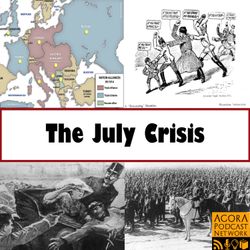
#59: 3 August 1914 III - House on Fire
52:42|Finally, Sir Edward Grey was ready to make his case to the House of Commons. Parliament had been starved of news for a week, and the press had done their best to fill in the gaps, but the whole country was desperate for an update. What would the government do if the rumours were true, and Germany had invaded France? Was neutrality on the table? And what of Belgium, who was protected by a treaty? How would Grey rally the House to his side, and did it even matter if he could not, since the Cabinet had already been convinced of the need to act thanks to various pressures?Grey was tasked with answering many of these questions, but there were many that he did not answer, and a surprising amount that he did not say. In this episode we give Grey's speech in the Commons - and the subsequent reactions - their proper attention. In a day suffused with monumental, watershed moments, not limited to Germany's declaration of war on France, Grey's speech represented the public culmination of a struggle which had gone on in private for several weeks. His seventy minute speech set the tone for what was to come, and effectively spelled out that Britain was bound to transform this European war into a world war.Support the July Crisis series, join the conversation, and find out more through these links:Do you want ad-free episodes with scripts attached, and bonus content? Support us on Patreon and you can suggest July Crisis episodes!Join our Facebook group as we make our way through this fascinating series!Click here to see our July Crisis workspace in Perlego, you'll find every source you need!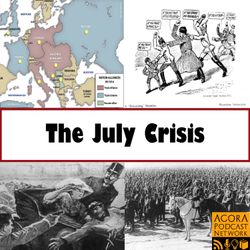
#58: 3 August 1914 II - Brussels Doubts
32:20|The German ultimatum to Belgium had roused the Brussels government and rallied the nation, but other than this, much was still unclear by the early afternoon of this Bank Holiday Monday. News of Belgium's determination to resist took a surprisingly long time to arrive, but more than that, how long was Germany willing to wait? Had she already begun her invasion of Belgium? Was she already at war with France? Doubts reigned supreme over what would happen next, but one man in particular was in dire need of clarity.British Foreign Secretary Sir Edward Grey was due to give his speech to the House of Commons imminently, but before he could, there was a lot of housekeeping to work through, to ensure that his transformative speech occurred in the best possible circumstances. At the very least, the Cabinet was no longer murmuring about a division, and those who decided to resign kept their choice quiet for now. Much would depend on the next few hours of this eventful day, but as had been the case so often by now, Berlin did much of Grey's work for him.Support the July Crisis series, join the conversation, and find out more through these links:Do you want ad-free episodes with scripts attached, and bonus content? Support us on Patreon and you can suggest July Crisis episodes!Join our Facebook group as we make our way through this fascinating series!Click here to see our July Crisis workspace in Perlego, you'll find every source you need!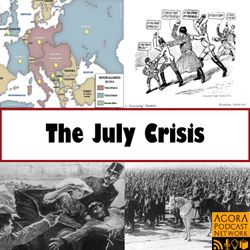
#57: 3 August 1914 I - Illusions and Delusion
33:27|The German army was firmly in control of German policy, but its next steps were obvious to any contemporary with even the slightest grasp of the situation. The detour into Belgium had been flagged long in advance by the French, and could only be looked at in one way. The solution, though not officially announced in Berlin, was to manufacture a wide range of rumours of French border violations into a kind of justification. This was brought to its logical conclusion, as the Germans tried to claim - with a straight face - that they needed to invade Belgium, because the French were about to invade there too, so it was essential for German security.Who could possibly believe such a naked set of lies? Remarkably, the rumour mill was so effective, that it was persuasive enough within German society, and among German officials. Countless communiques emphasised the defensive nature of Germany's offensive actions, and chastised other Europeans for their lack of understanding. Berlin could try to create this alternative reality, but in truth the Schlieffen Plan was the real driving force behind their actions, and other powers could clearly see this truth. Yet, in a policy which was as cynical as it was cringeworthy, Berlin persevered, insistent to the end that offence was defence, and the invasion of Belgium was an urgent matter of national security.Support the July Crisis series, join the conversation, and find out more through these links:Do you want ad-free episodes with scripts attached, and bonus content? Support us on Patreon and you can suggest July Crisis episodes!Join our Facebook group as we make our way through this fascinating series!Click here to see our July Crisis workspace in Perlego, you'll find every source you need!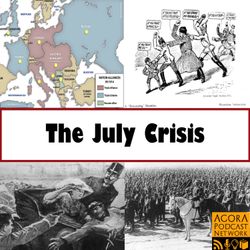
#56: 2 August 1914 IV - Let Loose World Madness
54:39|Even as Moltke examined Germany's strategic options, the world was turning against Germany. Berlin pressed its case by pointing out the Russian sins of dishonesty and pre-emption, but was anyone listening? Britain's diplomats in Berlin, St Petersburg, and Vienna had had enough. The news from Luxemburg was a clear sign of things to come, and even if they were sympathetic to the Kaiser's position, the German response was viewed as an overreaction. Declarations of war came from Berlin and Vienna, not Paris and St Petersburg, and this was bound to drown out any pleas about technicalities.To make up for this, German officials began reporting with increasing frequency on rumours and conjecture, dressing up impossible stories about outrages and violations as proof of Russian and French responsibility. But this only made their hole deeper, and even as Berlin cried foul, it was actively moving the ball forward, into Belgium. The imperatives of the Schlieffen Plan meant the ruin of Germany's reputation, and forced German officials to cling to the delusion that the eventual triumph would all be worth it - even while they opened Pandora's Box, and unleashed the madness of a great war upon the world.Support the July Crisis series, join the conversation, and find out more through these links:Do you want ad-free episodes with scripts attached, and bonus content? Support us on Patreon and you can suggest July Crisis episodes!Join our Facebook group as we make our way through this fascinating series!Click here to see our July Crisis workspace in Perlego, you'll find every source you need!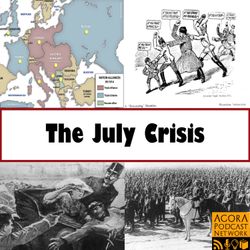
#55: 2 August 1914 III - Lichnowsky's Last Stand
46:25|While Germany covered itself in infamy, the German ambassador in London did his best to maintain the fragile Anglo-German relationship. His mission was ultimately doomed, but no one could accuse Prince Max Lichnowsky of failing to try. An avid Anglophile and advocate of closer ties between the two countries, Lichnowsky continued to hope that his masters in Berlin could be persuaded that it was worth making a sacrifice in the war effort, if it meant Britain stayed out of the war. Unfortunately for him, Berlin did not agree, and had effectively written Lichnowsky off as having gone native. Lichnowsky would not spare his masters from criticism, and would insist until the end of his life that Germany had been the agent of its own misfortunate, while he was just one of many casualties.Support the July Crisis series, join the conversation, and find out more through these links:Do you want ad-free episodes with scripts attached, and bonus content? Support us on Patreon and you can suggest July Crisis episodes!Join our Facebook group as we make our way through this fascinating series!Click here to see our July Crisis workspace in Perlego, you'll find every source you need!
The State of America w/ Thom Daly - Part 2
01:46:10|In this second part of my conversation with Thom, we discuss the unlawful way in which the Trump administration behaves at home, including its treatment of citizens who hold views which the President does not like. It is free speech for me, but not for thee, and we look at the historical context for these actions. Can anything stop Trump? Or are the courts as toothless as Congress and the press. Will the American people be forced to fix these things themselves, or is it already too late to return to the America we used to know? Thanksss again to Thom for joining me, and I hope you enjoyed this deep dive into modern America.
The State of America w/ Thom Daly - Part 1
01:20:11|In this first of two episodes with Thom Daly, we focus on the United States and its position in the world following the Trump administration's many blunders and betrayals in foreign policy, trade policy, and many more things besides. If you believe what Trump has done is antithetical to America and what it is supposed to represent, then you'll be in good company. Please join us for a passionate conversation, and let me know what you think.
#54: 2 August 1914 II - Britain Decides On War
47:42|The traditional picture of British intervention in the First World War normally comes down to one issue - Belgium. On 4 August, Britain did declare war on Germany. However, before this monumental step took place, Britain had already made its choice - or, rather, the British Cabinet had. The Liberal government was against intervention in a majority, and we have seen countless manifestations of this position over the previous days. Asquith, Grey, and Churchill wanted to intervene, but how could they persuade their colleagues of this? In this episode, we discover that the reasons for the government's conversion to intervention came not from Belgium, or France, or even Luxemburg, but from internal political factors.Simply put, when Grey, Asquith, Churchill and others signalled that they would resign if neutrality became policy, and when the Conservative opposition signalled that they would march to war if in power, the remaining Cabinet members faced an impossible choice. Either they could swallow their opposition, and concede to what Grey and the interventionists wanted, or they could resist, the government would collapse, and the Tories would take Britain to war regardless. As we will see in this episode, this was not much of a choice at all...Support the July Crisis series, join the conversation, and find out more through these links:Do you want ad-free episodes with scripts attached, and bonus content? Support us on Patreon and you can suggest July Crisis episodes!Join our Facebook group as we make our way through this fascinating series!Click here to see our July Crisis workspace in Perlego, you'll find every source you need!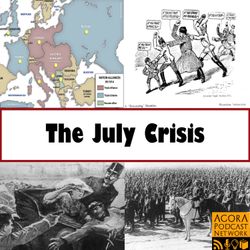
#53: 2 August 1914 I - Into Luxemburg
40:31|The Schleiffen Plan demanded an invasion of the small Grand Duchy of Luxemburg, where German forces would seize key railway installations, facilitating their march into Belgium, and then to France. Of course, nobody told the Luxemburgers, but Berlin was very eager to make it clear that this unannounced invasion was not an invasion at all. Oh no, this was merely a precautionary measure, essential for German security. If the Luxemburgers complied peacefully, all would be well. If not, well, then the Luxemburgers must be mad to face down the full might of 7/8 of the German army which barrelled towards them. As hundreds of thousands of soldiers flooded westwards, Europe was alight with diplomatic activity, complete with questions which really should have been answered by now. Peace was all but lost, but that did not mean the war had to arrive with any measure of clarity.Support the July Crisis series, join the conversation, and find out more through these links:Do you want ad-free episodes with scripts attached, and bonus content? Support us on Patreon and you can suggest July Crisis episodes!Join our Facebook group as we make our way through this fascinating series!Click here to see our July Crisis workspace in Perlego, you'll find every source you need!